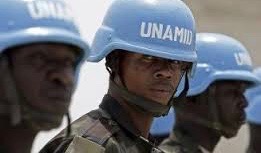SUDAN INSIDER |
This news summary is part of our Sudan Insider, a monthly newsletter providing
news and analysis on Sudan’s biggest stories.
Subscribe here to receive the Sudan Insider in your inbox.
…………………………………………………………………………………………………………..
UNAMID force cut by one-third
What happened…
The UN Security Council on June 29 voted to reduce the UN-AU Hybrid peacekeeping force in Darfur, UNAMID, by over a third of its troops and police officers. The resolution called for the eventual closure of 18 team sites in two phases, for reducing military personnel to 8,735 and cutting police personnel to 2,500. Previously in 2007, UNAMID had 19,555 military personnel and 3,772 police personnel.
Although reduced, the Security Council said UNAMID could not dissolve until a lasting peace deal is signed, and extended its mandate to June 30, 2018. The United Nations and the African Union are expected to report to the Council every 60 days with updates on political, humanitarian and security conditions in Darfur. Based on these reports, the Council can decide to stop the troops’ withdrawal if cases of violence against civilians or inter-communal fighting emerge.
The first phase of 11 closed UNAMID sites include: six in North Darfur (Abou Shouk, Zamzam, Al Malihah, Um Kaddaddah, Tine, Nellie), two in West Darfur (Habila and Foro Burunga), two in South Darfur (Edd al Fursan and Tulus) and one site in East Darfur, Muhajiriyah.
The decision came after the assistant secretary-general for peacekeeping operations, El Ghassim Wane, told the Council that Khartoum had reduced the rebellion to a small presence in Central Darfur. His report came about three weeks after a three-day conflict in east and north Darfur between the government and rebel forces under the command of Minni Minnawi.
What it means…
Policy analysts, humanitarians and activists fear the move will curb safe access for humanitarian operations and leave tens of thousands of conflict-affected people vulnerable to armed groups, especially in the displaced camps. The UN estimates there are roughly 2.7 million forcibly displaced, with over 1.6 million living in 60 displaced camps in Darfur.
Civilians continue to be targeted by pro-government militias such as the former Janjaweed, now re-branded as the Rapid Support Force (RSF) militia. From May 28 – June 15, the government-affiliated RSF and other sponsored militias raided a number of villages in the Ain Siro locality, North Darfur and the Nertiti area in Central Darfur. The attacks directly targeted civilians and displaced an estimated 35,000 civilians and killed at least 17 local residents.
But others question the efficacy of UNAMID to uphold its mandate to protect civilians, even its neutrality. In 2015, a UN report found five instances in which UNAMID withheld evidence of Sudan government-led crimes against civilians and peacekeepers.
Placing the debate over UNAMID efficacy aside, the Council appeared ready to curb support no matter the peacekeeper’s role in restive Darfur. This is largely based on U.S. policies to cut UN peacekeeping operations by $1 billion according to news reports. The U.S. pays for 28 percent of the peacekeeping budget, the largest share of any country due to the size of its economy and a permanent seat on the Council.





